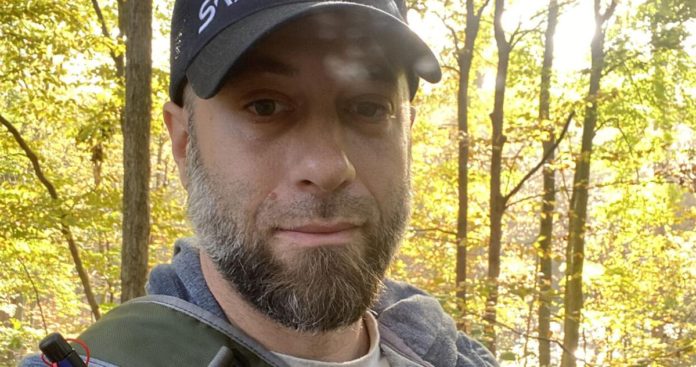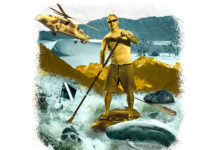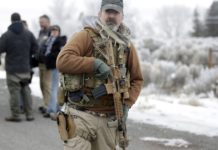One Bellevue University Professor is combining his love of the outdoors with his therapy sessions to treat combat-related PTSD.
Tony Parmenter, adjunct professor at Bellevue University and a licensed mental health professional, published a paper in February of 2022 about treating combat-related PTSD through the use of fly-fishing with eye movement desensitization and reprocessing (EMDR).
EMDR refers to an interactive psychotherapy technique used to relieve psychological stress.
The person being treated is asked to recall distressing images; the therapist then directs the patient in one type of bilateral stimulation, such as side-to-side eye movement or tapping either side of the body.
Parmenter was trained in EMDR in 2019 and used it in his full-time job as a therapist as part of an Employee Assistance program. These visits were short-term interventions and Parmenter desired to see patients for a longer period of time.
Parmenter said he decided to open a private practice and do some work on the side, but then the COVID-19 pandemic happened.
People are also reading…
“I was doing my full-time work and overtime and my private practice all from my barn,” Parmenter said. “After a few months of that and spring started coming, I was getting pretty burned out already from being in my barn for 10 hours a day, five days a week or more.”
It was time for the therapist to find therapy of his own and all it took for him was to spend more time outside.
Parmenter began to recall a program that he participated in previously that worked with first responders and veterans. One of the non-clinician staff members of the program would take the group out to go fly fishing. The group fishing was not attached to any specific therapy technique at that point.
“I thought, if I enjoy doing that with clients, I might as well do that for myself and so I started fly fishing again,” Parmenter said.
Parmenter used the Japanese-style form of fly fishing known as Tenkara.
Parmenter realized that the more he fished the more he was doing what his clients were doing in EMDR sessions.
“I started paying attention to what I was doing on the water and realized if I can do this, I might as well try to do it with clients,” Parmenter said. “ I started to write down what I was doing and began to research.”
Parmenter could not find any national programs that were using therapeutic fly fishing as a therapy method. If he did find some similar programs, they were not run by licensed mental health professionals.
In Parmenter’s experience, fly fishing was an adjunct to therapy sessions in the office — this would not be the case for his method with his clients.
“You can do both at the same time. That’s better for programs, to save resources, money and time,” Parmenter said. “The patients or clients get to learn that you don’t have to do things separately.”
He said patients could do their healing out in nature to influence healing.
“Anytime you’re in nature, you can kind of continue whatever was working for you in therapy or your healing wherever you are,” Parmenter said.
Parmenter found fly fishing to be an easy way for himself to enjoy nature and healing at the same time.
“I couldn’t find any other programs or therapists doing EMDR outside at the same time, like using fly fishing or another nature-based activity at the same time,” Parmenter said. “There was nothing written about it.”
Parmenter said he thinks that this non-traditional method of therapy could be appealing to veterans — a group he works with extensively.
Parmenter is a U.S Air Force veteran himself, having enlisted in the summer of 2001 before 9/11.
“When I was in the military, I saw people get kicked out of the military for having depression. I saw people not go take care of themselves and they wouldn’t go to counseling because they knew it would end up on their military record,” Parmenter said.
Parmenter was once punished and forced to seek counseling while in the military.
“When the system is set up like that, it doesn’t encourage people to go take care of their needs and it doesn’t encourage them to take care of their mental health,” Parmenter said.
He said military life creates a stigma around seeking assistance for mental health.
“I feel like a non-traditional approach is really great for people that are in the military,” Parmenter said. “It kind of takes them out of the office, that’s a little bit different for them and they can see it a little differently.”
Parmenter plans to offer fly fishing with EMDR to his patients and his office, right by a river, is a location suited for this.
“I have an intensive approach where I see people for three hours or sometimes people come for a whole day,” Parmenter said. “We’re able to make time and take it slow and use the outdoors for therapy.”
Parmenter said he hopes that the more people read his published study the more that therapist will be willing to incorporate nature-based techniques.
“I think it just opens the door for more creativity to happen, for people just to have more tools to bring into their therapy and make it relevant for people,” Parmenter said.
Those interested in reading Parmenter’s full study can do so at researchgate.net/publication/358286133_Treating_combat-related_Posttraumatic_Stress_Disorder_using_Therapeutic_Fly-Fishing_with_EMDR_TF-EMDR.
Credit: Source link




























